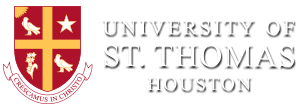Be Bold Blog
The University of St. Thomas (UST) is Houston’s Catholic University, committed to the Catholic intellectual tradition and the dialogue between faith and reason. Our blog is dedicated to helping you explore your future career possibilities and how to make the most of your college experience.
4 Things to Look For in a Cybersecurity Associate Degree

If you spend any amount of time online, you’re probably well aware that your digital browsing, shopping and sharing habits come with a certain level of risk. Hackers and cybercriminals are constantly on the hunt for new ways to scam, disrupt, damage and steal. When you think about the millions of interactions and exchanges that take place on the internet every single hour, it’s incredible that most people go about their day with no issues at all.
This ease of use can be at least partially attributed to cybersecurity experts, who work hard to protect the information and systems that make modern life possible. And with a cybersecurity associate degree, you could join the fight to make the internet safer. Keep reading for tips on how to find a top-notch cybersecurity program. But first, let’s start with the basics of the degree.
What is an Associate of Applied Science in Cybersecurity program?
An AAS in Cybersecurity is a 60-credit program that introduces students to the fundamentals of information security. The University of St. Thomas – Houston’s (UST) fully online cybersecurity degree is five semesters long and can be completed in as little as two years.
In this program, you can expect to take courses such as:
- Basics of Networking
- Mathematics
- Written Communication
- Client-Server Networks
- Foundations of Programming
- Intro to Linux
- Securing Information
- Risk Management and IT Security
- Network Communications Infrastructure and Technology
This degree will prepare you for entry-level positions in the fast-growing field. Upon graduation, you’ll also have the skills you need to take and pass exams for technical certifications that are highly valuable to potential employers. Popular certificates for cybersecurity professionals include:
- Certified Ethical Hacker (CEH)
- GIAC Security Essentials
- Certified Information Security Manager (CISM)
- Comp TIA Security+
- Certified Information Systems Security Professional (CISSP)
4 Components of a quality online cybersecurity associate degree
There are plenty of online cybersecurity programs to choose from, but they aren’t all created equal. To learn more about what you should be looking for in a cybersecurity associate degree, we sought insight from Brandon J. Carson, professor of cybersecurity, and Dr. Rebecca Dowden, director of the Associate of Applied Science program at UST.
1. Expert instructors with extensive industry experience
When studying cybersecurity, it’s ideal to have professors with real work experience in a variety of roles. This field is constantly growing and changing, meaning those not keeping up with new trends and developments will quickly be left behind.
Training under seasoned experts in the field not only helps you build tangible knowledge, but it also offers valuable professional insight and networking opportunities. Professors plugged into the cybersecurity industry can provide career guidance and help you make connections that could lead to future job opportunities.
2. Beginner-friendly curriculum
If a cybersecurity associate degree program requires students to have already mastered specific tech skills before applying, you might want to think twice about enrolling. This credential is meant to be entry-level and accessible for all students with a sincere interest in the topic.
“Our program assumes students have no industry knowledge when they start class,” Carson says. He describes how the curriculum is designed to build a foundation from the ground up, infusing key security practices and technical competencies through each step of the program.
“No matter where a person is or their level of knowledge, they can still be successful in this program,” Carson states. This is an important factor in helping diversify a tech field that is overwhelmingly white and male dominated.
3. Opportunities to develop soft skills
Some computer degrees make the mistake of focusing solely on technical skills. But in the real world, you’re likely to be working on teams, helping customers and finding solutions to complicated issues. This is why the UST program infuses both soft skills and technical competencies into one streamlined learning path.
“Written and oral communication are the most important soft skills that can be developed within any technical discipline,” Dr. Dowden says. “We also believe in the benefits of a Catholic education that focuses on ethics and social justice. This only adds to the student enrichment and future success.”
Some of the other soft skills you can expect to acquire throughout this program include:
- Critical thinking
- Problem solving
- Customer service
- Collaboration
- Teamwork
4. Focus on mastering technical competencies
As you might expect from a Science, Technology, Engineering and Mathematics (STEM) degree, cybersecurity students spend a lot of time honing their computer skills. UST’s cybersecurity associate degree emphasizes the importance of experiential learning that prepares students to be successful in the workplace after graduation.
“Our students really benefit from looking at security holistically,” Carson explains. “They partake in hands-on learning at every level of the Open Systems Interconnect (OSI) model.”
The OSI model is a standard created to ensure that all data communication systems across the entire globe are compatible and capable of communicating with each other. Understanding how all seven layers function and interact to protect vulnerable networks is the bread and butter of any cybersecurity training.
Here are a few examples of the hard skills UST students acquire in the cybersecurity associate degree program:
- Evaluate the security level of computer and network systems
- Recommend solutions to prevent breaches
- Implement and manage security devices, systems and procedures
- Ensure compliance with security standards and protocols
- Gather, monitor and analyze multiple data streams
Launch a rewarding career in cybersecurity
As you search for a cybersecurity associate degree that will prepare you for a successful career, it’s important to find a program that invests in you and your future.
“We at UST pride ourselves on our student-focused approach,” Carson shares. “We make sure everyone receives the support they need along the way.”
Now that you have a better idea of what to look for in a quality online cybersecurity degree, you can begin the search for your perfect fit. Learn more about how UST’s Associate of Applied Science in Cybersecurity program can help you become the coveted cybersecurity professional employers are seeking in as little as two years.
Ready to take the next step?
Related articles
About UST
The University of St. Thomas (UST) is Houston’s Catholic University, committed to the religious, ethical and intellectual traditions of Catholic higher education. For more than 70 years, we’ve been graduating students like you into successful careers in medicine, education, business, public administration and more – throughout Houston and across the globe.

